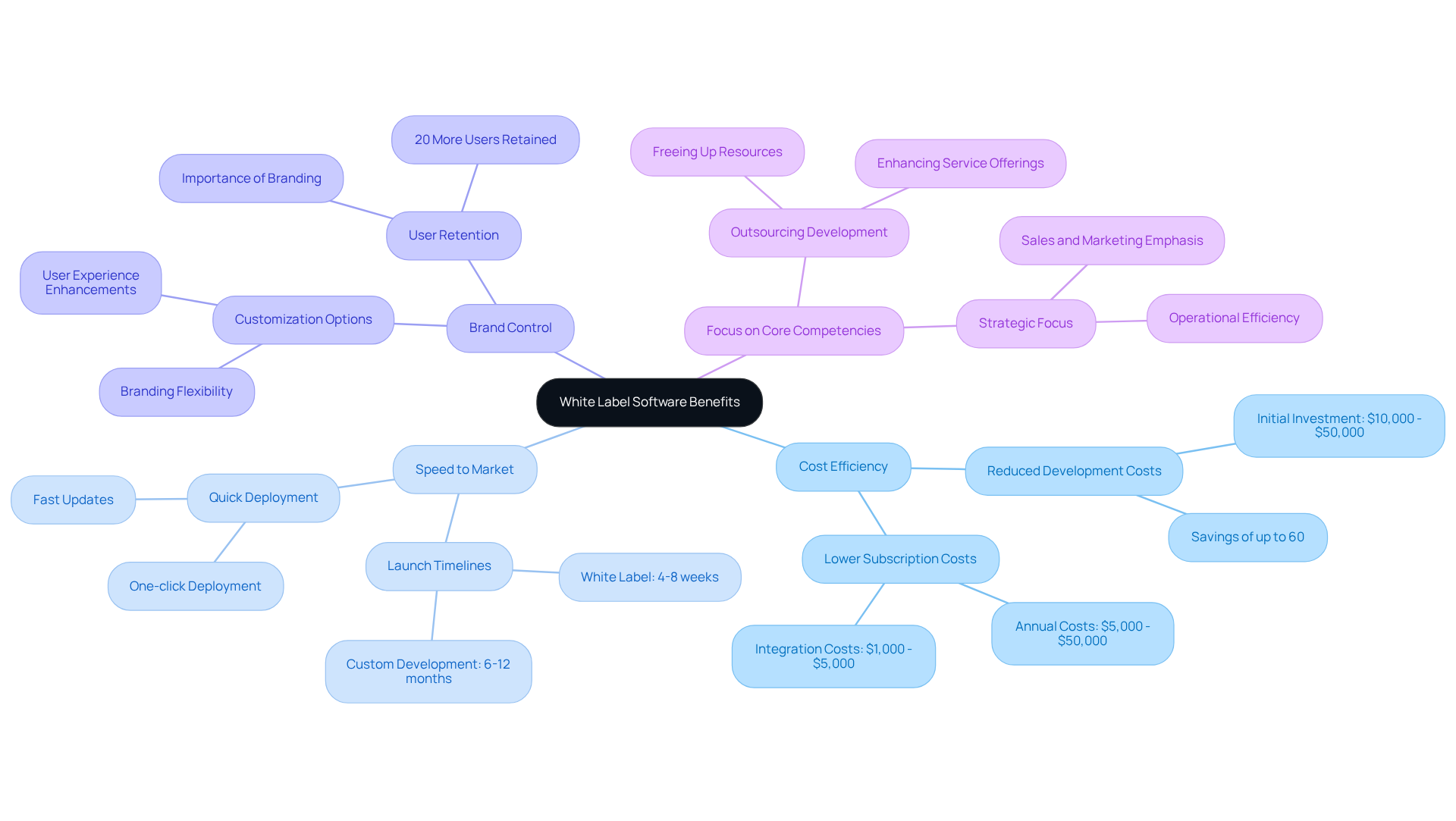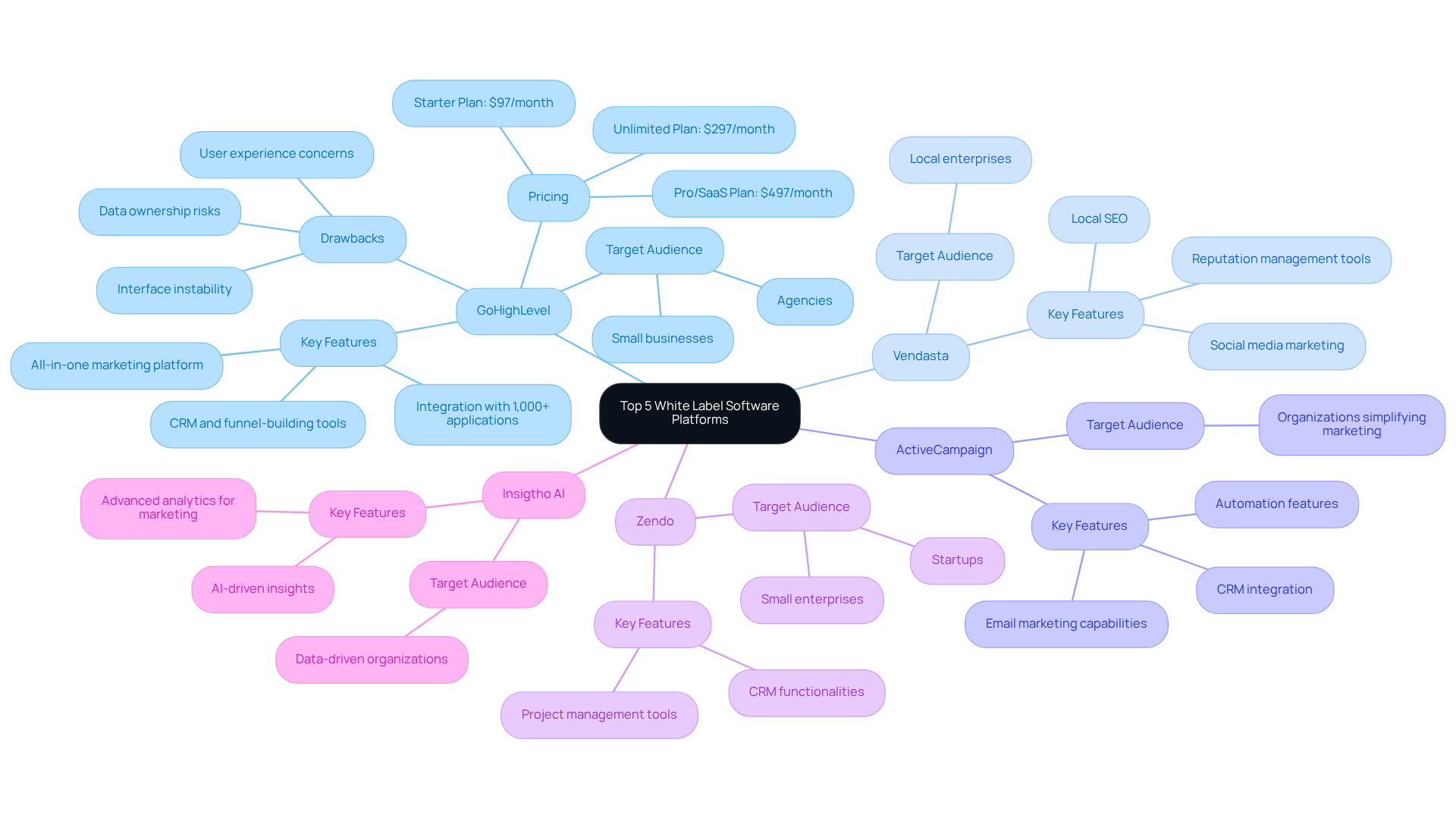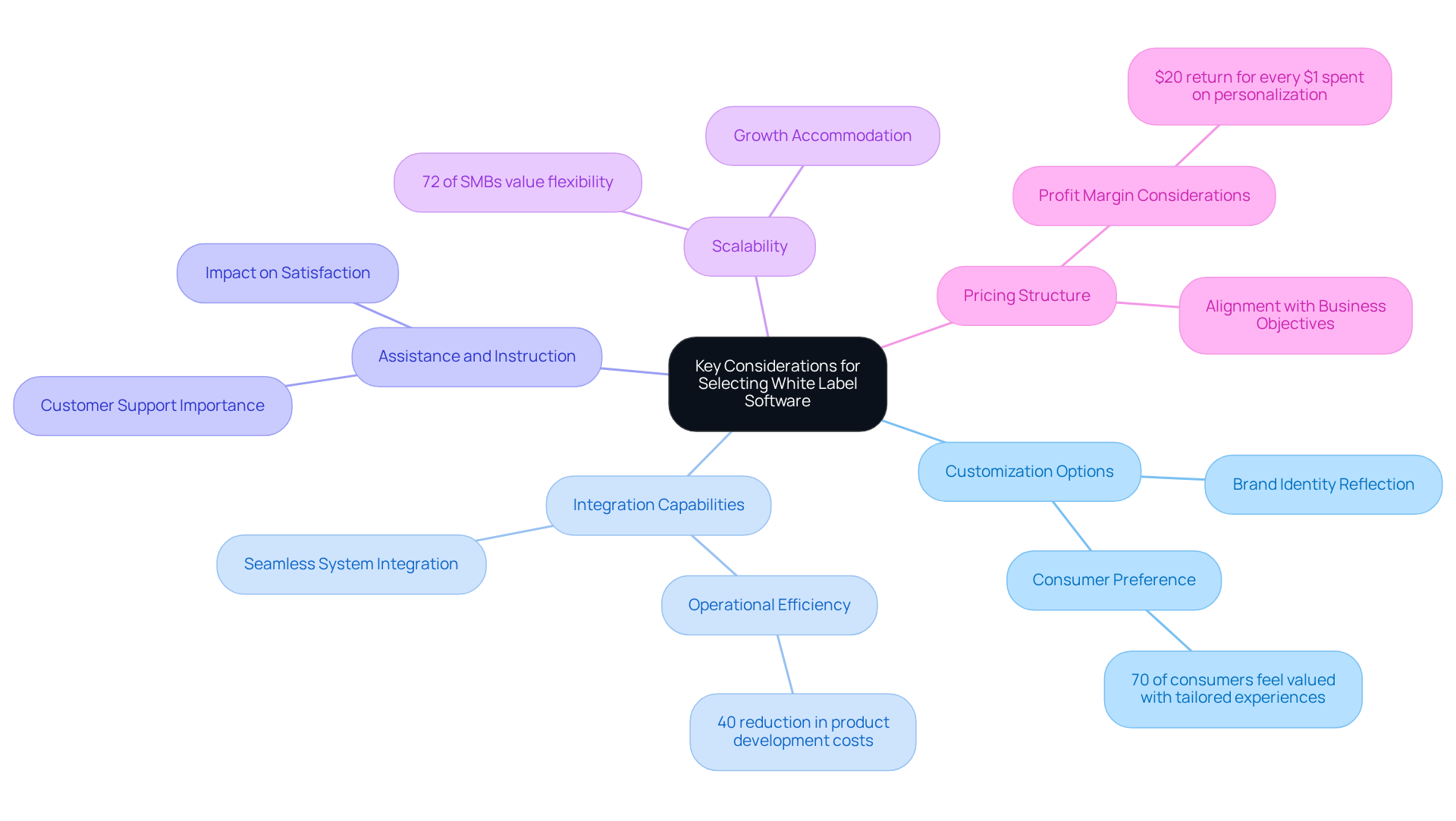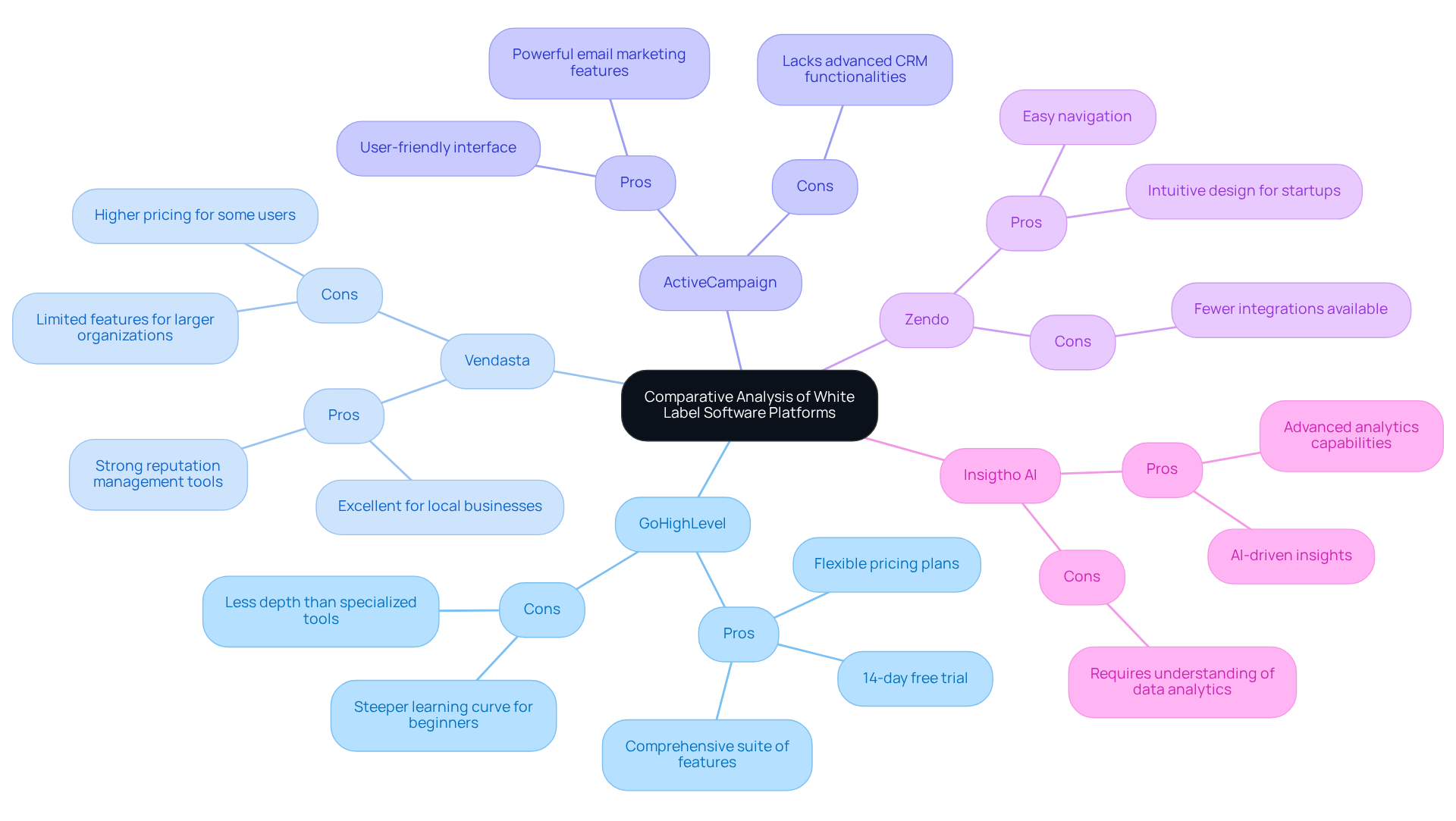Overview
Choosing the right white label software to resell is a critical decision that hinges on several key factors:
- Customization options
- Integration capabilities
- Customer support
- Scalability
- Pricing structure
These elements are not just technical specifications; they are essential for ensuring that the software aligns seamlessly with your brand, meets your operational needs, and supports sustainable growth.
Consider this: customization options allow you to tailor the software to reflect your brand identity, making it more appealing to your customers. Integration capabilities ensure that the software can work harmoniously with existing systems, enhancing operational efficiency. Customer support is vital; after all, when issues arise, having a reliable support system can make all the difference. Scalability is another crucial factor—your software should grow alongside your business, adapting to increasing demands without a hitch. Finally, the pricing structure must be competitive yet sustainable, allowing for profitability while remaining attractive to your customers.
Statistics show that businesses that prioritize these factors experience higher consumer satisfaction and operational efficiencies. By focusing on these considerations, you position yourself not just as a reseller but as a trusted partner in your customers' success.
In summary, when selecting white label software, keep these key factors in mind. They are not merely checkboxes; they are the foundation of a successful reselling strategy that can lead to long-term growth and customer loyalty.
Introduction
In the fast-paced world of digital solutions, white label software stands out as a transformative option for businesses eager to broaden their offerings without incurring the substantial costs associated with custom development. This innovative strategy empowers companies to rebrand and resell existing software, allowing them to penetrate the market swiftly and effectively.
However, with a multitude of choices at their disposal, how can businesses identify which white label software aligns best with their specific needs and objectives? By examining crucial factors such as:
- Customization
- Integration
- Scalability
Organizations can make well-informed decisions that not only enhance their service portfolio but also foster sustainable growth.
Ultimately, the right white label solution can be a catalyst for success, enabling businesses to stay competitive in an ever-evolving landscape.
Understanding White Label Software: Definition and Benefits
White label software to resell represents a strategic innovation in the business landscape, enabling one firm to create products that other enterprises can rebrand and sell as their own. This model empowers companies to deliver comprehensive solutions without the burden of extensive development resources. The advantages of white label software are compelling:
- Cost Efficiency: By minimizing the need for in-house development, businesses can significantly cut costs associated with building software from the ground up. Initial investments for generic platforms typically range from $10,000 to $50,000, compared to over $100,000 for custom builds. Moreover, companies can consider white label software to resell, which can reduce initial investment by up to 60%, making it a financially viable option for many.
- Speed to Market: Companies can expedite product launches by leveraging existing solutions to meet market demands. Using white label software to resell generally shortens launch timelines to just 4-8 weeks, compared to the 6-12 months required for custom development. This agility enables businesses to capitalize on market opportunities swiftly.
- Brand Control: Organizations can customize the system to reflect their branding, fostering customer loyalty and recognition. A 2023 UX study revealed that well-branded apps retain 20% more users, highlighting the critical role of brand integration in customer retention.
- Focus on Core Competencies: By outsourcing application development, companies can hone in on their primary operational activities, such as sales and marketing. This strategic focus allows them to enhance their service offerings without the distraction of development complexities.
In summary, private brand applications provide a strategic advantage for companies looking to expand their services without incurring significant overhead costs or delays. For instance, Sawyer Media Group has effectively leveraged generic solutions to triple their project capacity, while TD Construction Testing has saved over £30,000 annually by optimizing operations through generic applications. These examples underscore the tangible benefits of adopting this approach.

Overview of the Top 5 White Label Software Platforms for Reselling
Here are five leading white label software platforms that are popular among resellers:
-
GoHighLevel: This all-in-one marketing platform combines CRM, email marketing, and funnel-building tools. Recognized for its extensive features and customization options, it’s ideal for agencies aiming to deliver a comprehensive suite of marketing services. However, user satisfaction ratings indicate some concerns regarding its user experience and reliability. The platform offers various pricing tiers: the Starter Plan at $97 per month, the Unlimited Plan at $297 per month, and the Pro/SaaS Plan at $497 per month. Users have expressed frustrations with its interface and the risk of losing data ownership when utilizing agency resellers—essential factors for serious enterprises.
-
Vendasta: Customized for local enterprises, Vendasta offers tools for reputation management, social media marketing, and local SEO. Its strong focus on enhancing local visibility makes it a preferred choice for agencies serving small businesses.
-
ActiveCampaign: Known for its exceptional email marketing capabilities, ActiveCampaign also integrates CRM and automation features. Its user-friendly interface and robust automation tools are designed to improve customer interaction, attracting organizations looking to simplify their marketing strategies.
-
Zendo: As a newer player in the market, Zendo merges project management with CRM functionalities. Acclaimed for its user-friendly design and flexibility, it is especially well-suited for startups and small enterprises seeking an adaptable solution.
-
Insigtho AI: Leveraging artificial intelligence, Insigtho AI offers advanced insights and analytics for marketing campaigns. Its features are tailored for organizations aiming to utilize data for informed decision-making, making it a valuable tool for data-driven marketing strategies.
Each of these platforms presents unique features and benefits, addressing different market demands and commercial models. However, potential resellers should carefully consider the strengths and weaknesses of each option, particularly regarding user experience and data ownership when evaluating white label software to resell.

Key Considerations for Selecting White Label Software to Resell
When selecting white label software to resell, it’s crucial to prioritize several key factors that can significantly impact your success:
-
Customization Options: The software must allow for extensive customization to reflect your brand identity, including logos, color schemes, and user interfaces. Personalization is vital; in fact, 70% of consumers feel more valued when their experiences are tailored to their preferences.
-
Integration Capabilities: Seamless integration with existing systems, such as CRM or ERP platforms, is essential for efficient operations and data management. A robust integration capability can enhance operational efficiency, enabling businesses to adapt quickly to market demands. Companies excelling in integrating white label solutions often report a 40% reduction in product development costs, highlighting the financial benefits of effective integration.
-
Assistance and Instruction: Evaluate the extent of customer support and training provided by the vendor. Strong backing can significantly affect your ability to market and sustain the application, ensuring you meet client needs swiftly and effectively. Industry experts note that effective support can lead to improved customer satisfaction and retention.
-
Scalability: Choose a platform that can grow alongside your business. As your customer base expands, the software should accommodate increased demand without sacrificing performance. This adaptability is crucial; 72% of SMBs appreciate the flexibility offered by unbranded solutions, allowing them to modify their product range to meet changing market demands without substantial capital expenditure.
-
Pricing Structure: Analyze the pricing model to ensure it aligns with your business objectives. Consider factors such as upfront costs, ongoing fees, and potential profit margins. A well-structured pricing strategy can enhance profitability and support sustainable growth, with some companies reporting a $20 return for every $1 spent on effective personalization strategies.
By concentrating on these factors, you can select a private branding application that not only addresses your immediate requirements but also fosters sustained development and achievement.

Comparative Analysis: Pros and Cons of Each Platform
Here’s a comparative analysis of the pros and cons of the top five white label software platforms:
-
GoHighLevel
- Pros: Offers a comprehensive suite of features, including lead generation, pipeline management, and marketing automation. This makes it particularly beneficial for agencies looking to streamline operations. Its pricing plans cater to various organizational needs, and a 14-day free trial is available for new users.
- Cons: The platform's extensive features may overwhelm beginners, presenting a steeper learning curve for new users. While it offers a robust solution, it may not match the depth of specialized tools like Salesforce or HubSpot for certain advanced functionalities.
-
Vendasta
- Pros: Tailored for local businesses, Vendasta excels in reputation management and local marketing tools. This makes it a strong choice for community-focused enterprises. User feedback highlights its effectiveness in enhancing local visibility.
- Cons: It may not offer adequate features for larger organizations, and its pricing can be on the higher side for certain users, which could discourage smaller companies from adopting it.
-
ActiveCampaign
- Pros: Known for its user-friendly interface, ActiveCampaign delivers powerful email marketing and automation functionalities that enhance customer engagement. Users appreciate its intuitive design and strong support community.
- Cons: It may lack in providing advanced CRM functionalities compared to specialized solutions, which restricts its usefulness for enterprises needing more extensive customer relationship management.
-
Zendo
- Pros: Features an intuitive design that is flexible and adaptable for startups, facilitating easy navigation and use. Its user-friendly approach is beneficial for those new to white label software.
- Cons: As a newer platform, Zendo has fewer integrations available, which may restrict its functionality for some users looking for a more connected ecosystem.
-
Insigtho AI
- Pros: Provides advanced analytics and AI-driven insights, empowering businesses to make data-informed decisions. Its capabilities are particularly valuable for data-centric organizations.
- Cons: Users need a solid understanding of data analytics to fully leverage the platform's capabilities, which can be a barrier for some, especially those without a technical background.
This analysis provides a clear overview of what each platform offers, helping potential resellers identify the best fit for their business model and target market.

Conclusion
Choosing the right white label software to resell is a pivotal decision for businesses aiming to expand their offerings while minimizing costs and development time. This approach offers strategic advantages—cost efficiency, speed to market, brand control, and the ability to focus on core competencies. These factors underscore why many companies are gravitating towards white label solutions. By leveraging existing technologies, businesses can enhance their service portfolio and position themselves competitively in the marketplace.
This article highlights five key platforms:
- GoHighLevel
- Vendasta
- ActiveCampaign
- Zendo
- Insigtho AI
Each offering unique features and benefits tailored to different market needs. When selecting the ideal software, key considerations include:
- Customization options
- Integration capabilities
- Customer support
- Scalability
- Pricing structure
These factors are essential in ensuring that the chosen solution aligns with the business's goals and customer expectations.
Ultimately, adopting white label software is not merely about immediate gains; it represents a long-term strategy for growth and innovation. Businesses must thoroughly evaluate their options, weighing the pros and cons of each platform. By doing so, they can harness the full potential of white label solutions, paving the way for sustainable success in an ever-evolving digital landscape.
Frequently Asked Questions
What is white label software?
White label software is a type of product that one company creates and allows other businesses to rebrand and sell as their own. It enables companies to offer comprehensive solutions without needing extensive development resources.
What are the main benefits of using white label software?
The main benefits include cost efficiency, speed to market, brand control, and the ability to focus on core competencies.
How does white label software help with cost efficiency?
White label software minimizes the need for in-house development, significantly cutting costs. Initial investments for generic platforms typically range from $10,000 to $50,000, compared to over $100,000 for custom builds, potentially reducing initial investment by up to 60%.
What is the impact of white label software on speed to market?
White label software allows companies to expedite product launches, shortening launch timelines to just 4-8 weeks, compared to the 6-12 months required for custom development.
How does white label software enhance brand control?
Organizations can customize white label software to reflect their branding, fostering customer loyalty and recognition. A study in 2023 showed that well-branded apps retain 20% more users.
How does using white label software allow companies to focus on their core competencies?
By outsourcing application development, companies can concentrate on their primary operational activities, such as sales and marketing, enhancing their service offerings without the distraction of development complexities.
Can you provide examples of companies benefiting from white label software?
Yes, for instance, Sawyer Media Group has leveraged generic solutions to triple their project capacity, while TD Construction Testing has saved over £30,000 annually by optimizing operations through generic applications.






